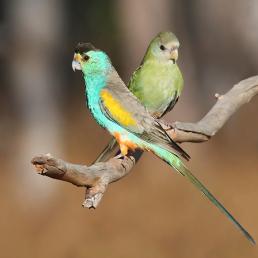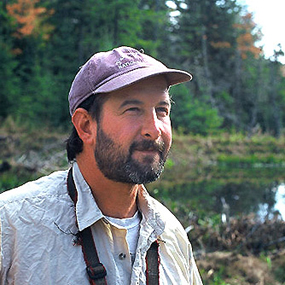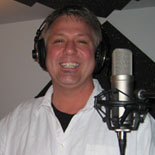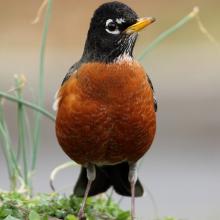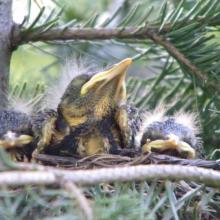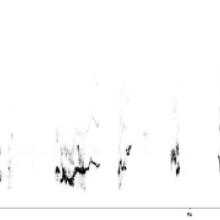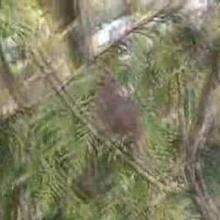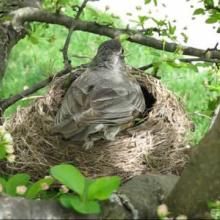

Join BirdNote tomorrow, November 30th!
Illustrator David Sibley and actor H. Jon Benjamin will face off in the bird illustration battle of the century during BirdNote's Year-end Celebration and Auction!
Even in winter, some birds — including Black-capped Chickadees, House Finches, and American Robins — greet the sunrise with song. We normally hear the dawn chorus in springtime, when birds sing to define territory and attract mates. But birds don’t breed by warmth alone. Day length is a far more reliable spark than weather. We know that photo-receptors in birds’ brains sense the increasing light. It triggers the production of hormones, which helps bring on the breeding season. Our early birds aren’t breeding in February. But they’re warming up.
Listen to this episode in Spanish here.
BirdNote®
Light and Song - Sparks in Winter
Written by Bryan Pfeiffer
This is BirdNote.
Even in the ruthless grip of winter, when the snow crunches beneath your boots, an ember glows in the lilt of a Black-capped Chickadee.
[Black-capped Chickadee “fee-bee” LNS# 58123 from 0:13 to 0:24]
Even in the northern states, where the Arctic can seem too close for comfort, springtime erupts from the song of a House Finch.
[House Finch song LNS# 22941from 0:31 to 0:33 and 0:36 to 0:38]
Even now, in February, when the air outside is brittle and painful, warmth rides the rhythm of an American Robin.
[American Robin song LNS#94261 from 0:12 to 0:21]
No, spring isn’t just around the corner — at least not in the north. But even in winter, some birds greet the sunrise with song.
[Chorus of the same three species]
We normally hear the dawn chorus in springtime, when birds sing to define territory and attract mates. But birds don’t breed by warmth alone. Day length is a far more reliable spark than weather. And in February, as the days grow longer, birds begin to sing a prelude to spring.
It’s not entirely clear how they measure day length. But we do know that photo-receptors in birds’ brains sense the increasing light. It triggers the production of hormones, which helps bring on the breeding season.
[Chorus of the same three species]
For BirdNote, I’m Michael Stein.
###
Bird sounds provided by The Macaulay Library of Natural Sounds at the Cornell Lab of Ornithology, Ithaca, New York. 58123 recorded by William W. H. Gunn, 22941 recorded by William R. Fish, and 94261 recorded by Wilbur L. Hershberger.
BirdNote’s theme music was composed and played by Nancy Rumbel and John Kessler.
Producer: John Kessler
Executive Producer: Sallie Bodie
© 2017 Tune In to Nature.org February 2017/2019/2022 Narrator: Michael Stein
ID# song-15-2017-02-27 song-15
